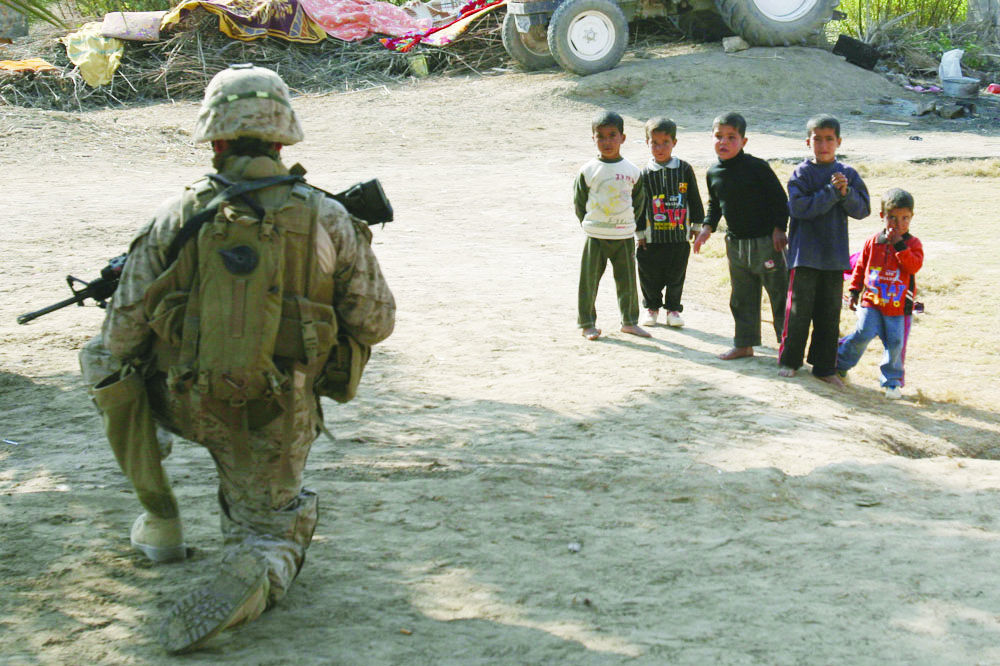America’s intervention obligation
U.S. Marine Corps Lance Cpl. Julio Perez, with I Company, 3rd Battalion, 3rd Marines, provides security as Iraqi children observe in Zaidon, Iraq, on Dec. 30.
August 28, 2014
As the civil war raging in Syria fades to the back of headlines, a new conflict has rapidly emerged to take its place at the forefront of the global conscience. The Islamic State (IS), formerly known as ISIS, has captured large swaths of territory across Syria and northern Iraq and murdered thousands.
Recently, IS captured a major air base in northeastern Syria, the last government outpost in the area that had not been dominated by an extremist group, according to CBS.
This victory will no doubt supply the Islamic State militants with further weaponry and possibly armor to be used against their enemies and civilians across the region.
These extremists can be contained. The United States has an obligation to intervene on behalf of the Western world to bring justice to a region in turmoil.
A struggling Kurdish Peshmerga, the Kurdish military, already lacks an adequate amount of conventional arms and may be further outgunned by terrorists who seek to take their lands and commit genocide against those who were previously protected.
The capture of the Mosul dam prompted humanitarian intervention from the Obama administration, and on Aug. 8, the first airstrikes against IS extremists began.
Unfortunately, these airstrikes have not deterred the barbarians fighting under the black flag of the caliphate. Just recently, American journalist James Foley was beheaded in response to American presence in the area.
Now, New York Daily News is reporting that Islamic State supporters are threatening to strike within the United States, tweeting ominous photos of their flag in D.C. and Chicago with the words, “We are in your state. We are in your cities. We are in your streets.”
Texas Governor Rick Perry said Thursday a “very real possibility” existed that these terrorists had already crossed into the U.S. through the southern border, as reported by CNN.
In response to these threats, the FBI and Homeland Security distributed bulletins on Friday urging greater vigilance in detecting terror activity on American soil.
Back in Iraq, however, the U.S. is taking the fight to the Islamic State, with more than 400 advisers in Iraq, four warships in the gulf, and hundreds of marines and army troops in and around the embassy in Baghdad.
With the recapture of the Mosul dam and Kurdish victories in and around Irbil to contain IS advances, U.S. officials now say that America will not be restricted by borders in combating the Islamic State.
Indeed, operations have already begun in recent days, with defense.gov reporting on an unsuccessful hostage rescue mission within Syria utilizing “air and ground components.”
Intervention in this conflict will remain necessary to protect American interests within the region as a whole, and the monetary cost is certainly worth every penny to protect much more important human capital.
During this same time last year, Think Progress reported that a boots-on-the-ground approach in Syria could cost billions, and leaving a warship in the region cost $25 million per week alone. Reuters has disclosed information claiming the war in Iraq itself cost more than $2 trillion.
With these figures in mind and the American economy recovering well, it’s important that the U.S. avoids a quagmire fighting a faceless enemy.
Instead of committing U.S. troops to combating the Islamic State, training should be given to Kurdish forces, along with light conventional weaponry so that they may conduct operations on the ground.
The U.S. simply must continue to provide air support and work alongside local governments, providing intelligence that will assist in the capture of enemy combatants. The American military and intelligence community can be the backline in the battle with the Islamic State.
Finally, although the United States maintains a global position adequate enough to shoot first and ask questions later, it is important that multinational backing is found for a war against the caliphate.
Abu Bakr al-Baghdadi and his brutish followers are a threat not just to Western interests, but to the world at large, and therefore they should be combatted as such. By first eliminating the Islamic State’s leadership, friendly forces may cut the head off the snake and leave these savages scrambling to find direction.
It is the responsibility of this nation to remain an integral component of resolving the conflict in Iraq and Syria. However, rather than asking soldiers to leave their homes and families once more, training and arms should be provided to those who live and maintain a stake in the region.
By securing partners in the fight against the black flag militants, the U.S. may ensure local governments receive the support they need to continue battling extremism after American presence is absent in the region.
Secretary of Defense Chuck Hagel believes the Islamic State to be unlike anything we’ve ever seen. If that is truly the case, then it is the responsibility of a just world to band together and save those in harm’s way.



















